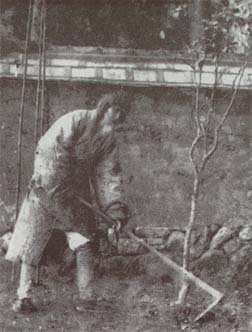Tłumaczenie: Konrad Uliczkowski

O Nowicjuszach ubranych po raz pierwszy
Budda ubolewa, że
musimy stawiać czoło takim trudnościom.
Jest on tak mocno zatroskany
Ludźmi takimi jak my.
Nie pozwól ładnym kwiatom oślepiać
twoje młode oczy .
Pusty pokój nie może stać się
zakurzony
I nawet szczęśliwy faworyt jest
ścigany przez śmierć.
Tak więc nie bądź zbyt wyniosły czy
niecierpliwy.
Daj sobie czas i pozwól nam
pokazać ci
Jak założyć i zawiązać szaty
mnicha .
Na początku nie było żadnego
wzoru za którym można by podążać
Kto wiedział co było potrzebne by
zrobić ?
Patrz! Jeden fałszywy ruch i
znowu jesteś zaplątany .
Tak, daj sobie czas i pozwól nam
pokazać ci
Jak założyć i zawiązać szaty
starego mnicha.
Żegnając przyjaciela pieszo
Czy pamiętasz jak kiedy
byliśmy młodzi szybowaliśmy.
Teraz, jesteśmy starzy i kulejemy
pieszo .
Wtedy byliśmy tak pełni pomysłów
i zuchwali
Wkładaliśmy nawet wodę w
chmury .
Teraz dźgamy śnieg
naszymi laskami.
I martwimy się mrozem i
wiatrem.
No cóż... jesteś teraz sławny.
Twoje prace literackie są szeroko
znane.
Twoja reputacja przebyła
całą drogę aż do Pałacu.
Król, jak to rozumiem, jest
całkiem pod wrażeniem.
Teraz, życie w górach
spełnia wszystkie moje pragnienia.
Mogę pochwalić się, że
znałem cię „wtedy” ...
Tak więc wyślij mi list by to udowodnić
- i nie zapomnij
Załączyć niektóre z twoich
wzruszających wersów.
Świątynny Pokój Gościnny
Gość jest przyjmowany w Pokoju Cunxiang.
Posiłek jest skromny i serwujemy wodę
zamiast herbaty .
Nie narzeka ale nie mówi dużo.
Nie ma wiele do powiedzenia co byśmy
już nie wiedzieli.
Jest trwałość jeśli chodzi o zmieniające się
wieści ze świata.
Ale tu w górze, górskie drzewa wspierają tak wiele
ratanowych winorośli.
I źródła wody nigdy nie zawodzą by ugasić nasze pragnienie.
Czas mija tak szybko w tym odosobnionym miejscu
Ledwo co mamy czas by osiągnąć
oświecenie.
Co on myślał, ten gość, który odrzuca
słowa Buddy?
Czy myślał, że to co mieliśmy mu do zaoferowania
Pochodziło z klasztornej spiżarni?
Pochwała Starszego Mistrza Gu Tinga
Znowu, jestem dłużny Starszemu.
Nie tylko zawsze wypełniałem
się jego skarbami
Ale jego wizyta tutaj tej nocy
podsunęła mi temat na tę
rozprawę.
Przyjechał: Świeży wiatr dmie
Poprzez otwarte pole.
Przyjechał: Piękne słońce
Przybywa porankiem.
Nawet złote ściany muszą
uszanować wiatr.
Jego skarby! Jest on w najgłębszym sensie
źródłem Czan!
Z jego głębin wyłaniają się fortuna
i mądrość.
Życzeniem wyparowuje
oceany zimowego smutku
I tworzy Wiosnę we wszystkich
Dziesięciu Kierunkach.
Powracając na Górę Gu po Czterdziestu Latach nieobecności by towarzyszyć w przygotowaniach Pogrzebowych dla Xiangliana Gonga .
To był mój górski
dom.
Teraz to miejsce i ja jesteśmy sobie
obcy .
Moje włosy, całe nabrały pasm szarości;
Ogród na dziedzińcu, suchy i
wypełniony skarłowaciałym zielskiem.
Xianglian Gong i ja byliśmy starymi
przyjaciółmi ,
Ale nie rozpoznajemy się
nawzajem .
Może odosobniłem się zbyt daleko.
Przeszłość pędzi w górę do
mnie .
Zdezorientowany pytam się, „Co powinienem zrobić następnie?”
Spoglądam wokół, oszołomiony tak
wielkim niedbalstwem.
I dopiero wtedy zauważam, że łzy
spływają po moich policzkach.
Ofiarowane Xing Jingowi, Koledze Członkowi Sanghi
Mój dom może być gdziekolwiek,
niebo czy ziemia.
Wszystko czego mi trzeba to pokój w moim sercu.
I dobrego źródła wody,
oczywiście .
Jeśli jestem na górze, mogę ustalić
swoje własne tempo.
Tu na dole, jestem zajęty odkładaniem
ziół .
Ale nawet jeśli nie jestem zajęty, ciągle
nie czytam dużo.
Potrzebujesz pokoju w swoim sercu...
dużej pustej przestrzeni,
By uporządkować to co rzeczywiste od
tego co nie jest.
Świątynia Karmazynowego Strumienia
Na Karmazynowym Wzgórzu chmury są
najgęstsze ;
Ale droga mistyka jest jasna
mimo że zakręca
Znowu i znowu.
Górskie kwiaty, lśniące
oszroniona rosą,
Widać w nich księżyc;
I bezpieczny wewnątrz stojących
bambusów , zimorodek
Beszta ludzkość.
Świtem, deszcz wybija tatuaż na
skałach.
W dziwacznym wypadzie, smok
uderza na odległe kryjówki,
Sprawiając, że chmury przybywają tak gęste
że poranek zmienia się w zmierzch.
Do południa jest Rozejm!
Słońce i pokój i świat
który jest świeży i nowy.
Spędzając Zimę w Yunhua ale nie spotykając się z moim przyjacielem.
Przybyłem do tego miejsca gdzie
drzewa są myląco grube.
Nagle w pałąkowatej krypcie
lasu odnalazłem ścieżkę.
Przesunąłem ten kamień... ten
poniżej zielonego pawilonu.
Był szron na liściach
a koniuszki gałęzi były nagie
i czerwone.
Kto to był kto wykuł te
emocjonalne słowa w skale?
Czekałem. A... Wszystkie uczucia,
Czy nie są tylko pustką
„mnie”?
Bramy Czan, obydwie, odpoczywają
teraz cicho
Ze śliwami i
trawami
Oczekując wiatrów Wiosny.
O złożeniu wizyty w Świątyni Longhua w Rangoon
Z tego strategicznego punktu,
można kontrolować Południowe Morza.
I tak więc Buddyjski Pałac został
zbudowany ze Złudzenia Smoka.
Kadzidło unosi się ze
Złotej Pagody.
Sam Budda wydaje się
Pojawiać się w dymie
Budynki na podwórzu
chyba powinny być zamknięte.
Most do tego miejsca zaczyna
wspierać jeden koniec jadeitowej
tęczy.
Tu, niebo i człowiek mogą się
spotkać
By uhonorować się jednym
dźwiękiem ze świątynnego dzwonu.
Wiosenny Deszcz wszędzie bez końca
Długie deszcze – to jest prawdziwy początek wiosny.
Wszędzie gdzie tylko się nie spojrzysz – blisko czy daleko
Wszystko jest świeże i nowe.
Zimna szara góra przybiera subtelnych
kolorów.
Kamienne schody tak wymyte nawet ziarnko
kurzu nie zostaje.
Wierzby zdecydowały się na swoją jedyną
rolę:
Koić twoje oczy pięknem
Kwiaty ciągle śpią.
Nie otworzyły swoich ust by wyjawić
cokolwiek.
Jest ekstra trawa rosnąca na krawędzi
schodów.
Jest tak chętna by cieszyć, kiedy stąpasz po niej
Poddaje się łagodnie, potem podnosi się,
Tak jakby jedynie kłaniała się tobie.
Baoxi Tiefo w Shanxi
Jeśli wejdziesz głęboko w
las,
Na skraju białych
chmur,
Odnajdziesz świątynię.
Sosny są stare – tak wiele
lat jak łusek na
smoku.
Klify są zbyt strome nawet
dla tygrysów by spać na nich.
Kiedy zimny dzień zaczyna najeżdżać
niebiosa,
Dźwięk śpiewanych sutr
oczyszcza twoje uszy.
Czy ważę się zapytać o Starego Panga
Meia – Stare Duże Brwi?
Jak długo udało mu się
żyć tu?
